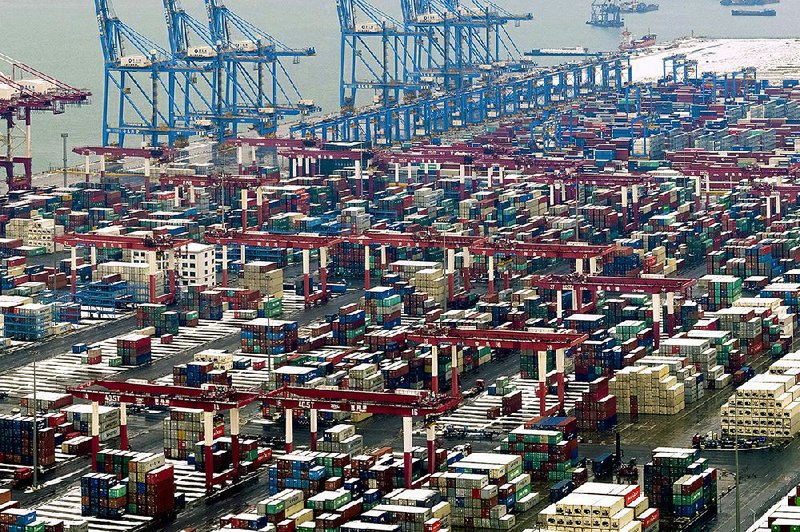BEIJING -- China's stock market surged Monday after President Donald Trump's decision to postpone a U.S. tariff increase on Chinese imports and state media expressed hopes the fight with Washington over Beijing's technology ambitions can be resolved.
The Shanghai Composite index jumped 5.6 percent after Trump announced he was extending this Friday's deadline. The benchmark was trading at its highest level in about eight months on the news that the truce in a trade war between the world's two biggest economies would continue.
Other financial markets in Europe and Asia recorded more modest gains after Trump's announcement that the Washington talks made "substantial progress" toward ending the tariff fight.
U.S. stocks posted early gains Monday after the announcement, then drifted lower during the day, but still closed in positive territory.
The conflict has threatened to disrupt global trade and drag on weakening economic growth.
Trump said he would postpone the deadline for increasing 10 percent duties on $200 billion of Chinese imports to 25 percent but he set no new date.
Washington accuses Beijing of stealing or pressuring foreign companies to hand over technology. The Trump administration wants China to roll back plans for government-led creation of global leaders in robotics and other technology that its trading partners say violate Beijing's free-trade obligations, and some American officials worry they might erode U.S. industrial leadership.
The two sides met for a seventh round of talks last week, the third talks in a month, to try to make headway on these issues.
Talks over the weekend made progress on technology transfer, protection of intellectual property rights and nontariff barriers to market access, according to the official Xinhua News Agency. It cautioned there are "still some differences that need more time to be ironed out."
On Twitter, Trump said negotiators also made progress on U.S. agricultural sales to China.
Neither government gave more details but both expressed optimism.
Trump said many disputes will take more time to resolve but he hopes to "put these more challenging issues into a longer-term negotiating framework." He said if progress is made, he will meet Chinese President Xi Jinping at his Florida resort to finalize an agreement.
"If all works well, we're going to have some very big news over the next week or two," Trump told American governors at a White House ball. He added, "We still have a little ways to go."
The talks "sent a positive signal to the world" and "laid the foundation for the final agreement," the Communist Party newspaper People's Daily said.
"China solemnly shows it is willing to adopt a cooperative approach to resolve economic and trade frictions," the newspaper said.
Trump's decision was a "positive signal," said the vice president of the U.S.-China Business Council, Jake Parker.
The decision "seems to indicate that there's enough forward momentum that they believe they don't need to raise tariffs now," Parker said.
"The nearer we are to the finish line, the more we have to rely on the decisive factors of rationality and calmness," the Chinese language edition of the Global Times, a nationalist tabloid, wrote in an editorial Monday, after Trump announced his decision in a tweet. "In order to prevent further uncertainties, neither side should chase after petty gains when the bigger picture is coming into shape."
Even if the two sides reach a compromise on trade, relations also are strained by disputes over technology, investment and geopolitics.
"The U.S.-China relationship should remain contentious," Marie Diron of Moody's Investors Service said in a report. She expects relations to "swing between compromise and conflict."
Trump's Sunday night tweet showed how far apart the two remained, said James Zimmerman, an American lawyer in Beijing and former head of the American Chamber of Commerce in China.
"The tariff postponement simply means that both sides realize that they are nowhere near a viable deal and to avoid a showdown later this week, they need some breathing room," he said.
A potential stumbling block is Chinese resistance to U.S. pressure for an enforcement mechanism with penalties if Beijing fails to carry out its commitments. American officials accuse China of failing to fulfill past promises to change economic regulations.
The world's two biggest economies have raised tariffs on billions of dollars of each other's goods.
Trump and Xi agreed Dec. 1 to postpone more penalties while they negotiate. Increases that already were imposed remained in place, battering companies on both sides.
Some Chinese were skeptical.
"We won't really fight, right? A trade war, by its nature, is nothing more than a war of words, isn't it?" said Geng Yanhua, an employee of an Internet company.
"Playing up the tariffs issue only won't really hurt us," said Geng. "It will be fine as long as no one wages a war."
Information for this article was contributed by Joe McDonald, Fu Ting and Liu Zheng of The Associated Press; by Sarah Ponczek and Reade Pickert of Bloomberg News; and by Anna Fifield, Liu Yang and Lyric Li of The Washington Post.
Business on 02/26/2019
